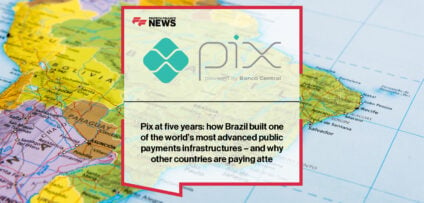Breaking News

Filling the gaps
A trend towards outsourcing is redrawing the ATM cash replenishment map on the continent of Europe. Robert Chaundy, Associate at retail banking research group RBR, explores where the opportunities lie
RBR’s latest global ATM survey has revealed how different European countries approach ATM cash replenishment.
The study, Global ATM Market And Forecasts To 2023, shows how central Europe increasingly resembles western Europe, while eastern Europe – Russia and its neighbouring states – is shaped by different historical practices and regulation. In western Europe, distinctive practices can be observed in the north and south. So, how does the map look?
Western Europe: a north-south divide
RBR’s study shows that, in most of western Europe, it is still common for bank staff to refill branch ATMs. This makes sense in large branches where workers are trained for such tasks, but it is not always suitable for smaller branches.
ATMs inside the branch are usually straightforward for bank staff to refill, but those facing the street, for security reasons, must usually be replenished by third parties. Italy, Denmark, Greece, France and Turkey all have high proportions of such machines.
In some western European countries, the refilling of most or all branch ATMs is outsourced. In the Netherlands, Sweden, Norway and Finland, nearly all branch ATMs are replenished by private players, while in Germany the proportion is nearly three-quarters. In the Mediterranean, figures are much lower with no outsourcing of cash replenishment of branch machines at all in Greece and Spain, despite southern European banks having above-average numbers of through-the-wall ATMs in Europe.
UK moving away from outsourcing cash replenishment
Across most of western Europe, non-branch ATMs are routinely refilled by third parties. At the end of 2017, cash replenishment was outsourced for nearly 90,000 off-site ATMs, or almost two-thirds of the total.
Cash replenishment is outsourced for all non-branch ATMs in Germany, Ireland, Italy, Portugal and Spain, and in most other western European markets for the vast majority of machines. The main exceptions are the UK and Turkey, where around two-thirds of off-site ATMs are refilled by the deployer, and France where this is the arrangement for a third of remote ATMs.
The UK is the only market that has seen a significant move away from outsourcing – there, the share of ATMs for which cash replenishment is carried out in-house rose from 36 per cent in 2014 to 67 per cent in 2017. This is because the UK market is increasingly independent ATM deployer (IAD)-heavy, and these companies tend to keep cash replenishment in-house.
Regulation still an obstacle in eastern Europe
Several eastern European markets are challenging environments for would-be cash replenishment providers.
Russia and Ukraine together account for 60 per cent of central and eastern European ATMs; in Russia, cash replenishment outsourcing runs at 48 per cent, and in Ukraine at just 11 per cent. In Ukraine, only licensed banks can carry out cash in transit (CIT) and cash replenishment services, and this is also true of neighbouring Belarus.
Outsourcing that does exist in these markets is to other banks.
The same practice of outsourcing to banks exists in Russia, but now covers less than 10 per cent of the country’s ATMs. State-controlled companies such as Rosinkas and CCCB refill a third of ATMs, while private sector providers, such as Brink’s and Inkakhran, are also active.
Cash replenishment is outsourced for most Polish ATMs
RBR’s research shows that central Europe may be more promising territory for CIT and cash replenishment providers.
Poland, the second largest market in central and eastern Europe, a more liberal economy without regulatory barriers, has seen outsourcing grow quickly in the last five years to 69 per cent of ATMs in 2017. IADs own nearly half the country’s ATMs, but unlike UK IADs, these companies often outsource cash replenishment.
In Croatia, the Czech Republic, Hungary, Slovakia and Slovenia, more than half of ATMs are already refilled by commercial providers. Opportunities remain in these markets, however, as bank staff still replenish more than 11,000 ATMs. Banks are keen to cut costs, meaning that new outsourcing providers still have chances to prosper.
Opportunities remain
Some eastern European markets will remain difficult for cash replenishment providers to enter, but may open up in future. Even in central and western Europe, the trend is towards greater outsourcing, and competition with established players can still open doors.
This article was published in The Fintech Finance Magazine: Issue #12, Page 65.
- DataHaven on Insurance Fundamentals: Risk, Capital, and the Balance in Between Read more
- Why Google Believes Multimodal AI Is the Next Big Shift for Enterprise Use Cases Read more
- Pix at five years: how Brazil built one of the world’s most advanced public payments infrastructures – and why other countries are paying attention Read more
- Clara Renews $150 Million Debt Facility With Goldman Sachs to Scale Payments Products in Mexico, Bringing Total Debt Capacity to Over $250 Million Read more
- Clip Unveils Clip Total 3, the Most Comprehensive Mobile Point-of-Sale Terminal for Mexican Businesses Read more

















